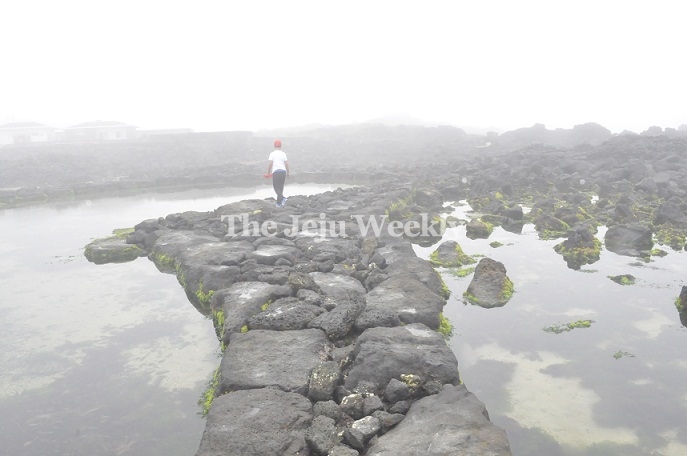| |
 |
|
| ▲ Misty Hado village. Photo by Kim Jinmi |
[This article is written by a JDC Junior Journalist. The JDC Junior Journalist program is an educational project sponsored by Jeju Free International City Development Corporation (JDC). JDC Junior Journalist articles are only briefly edited by mentors before publishing.]
Jeju is famous for samda. In Korean “sam” means “three,” and “da” means “a lot of.” In the case of Jeju, samda refers to a bountiful trifecta of stones, wind, and women. Above all, haenyeo, represents the women of Jeju.
Haenyeo are the woman who dive under the sea to catch seafood for a living. To earn money for their families they became haenyeo when they were teenagers.
Haenyeo works under the sea without any breathing equipment, with only their wetsuits, sacks, and hoes. Ham Suk-hee, a haenyeo from the Hado village said that the haenyeo can hold their breath underwater for more than 3 minutes.
The work of a haenyeo is hard because they must bear the water pressure for a long time. They often suffer from ailments such as headaches, lumbar disc herniation, and heart attacks. So they can receive medical aid for free, if they hold the certificate of haenyeo.
The Haenyeo also confronts many dangerous situations. Park Mi-jeong, a haenyeo working in the Hado village said, “I have been lost out at sea because of fog. I was also nearly hit by a boat.”
Because of the rough nature of the proffession, nobody wants to be a haenyeo today. Both of the haenyeo that were interviewed said that they do not recommend the job because it’s too dangerous and hard. Park said, “I hope the young haenyeos can receive more aid, such as oxgyen tanks.” However, using underwater breathing equipment is prohibited in order to prevent excessive harvesting.
Nearly all the haenyeo are more than 50 years old. Therefore, it appears that the haenyeo proffession will soon disappear.
Those who wish to learn more about the heanyeo can attend the annual haenyeo festival at the haenyeo museum in the Hado village. Visitors can fish on a traditional boat, 바릇잡이(baleutjabi: catch seafood by the tide-pools,) 물질체험 (muljilcheheom: experience the hanyeo’s daily work,) and we can also see a lot of interesting things such as the Haneyeo’s dance, a cooking contest, and a reading of the Haenyeo’s literary works.
Sumbi is a high-pitched whistling sound that results from the Haenyeo’s hard inhalation after surfacing. Sumbi: the most beautiful sound of Jeju, still resounds throughout the coastal waters of Jeju.
|




















